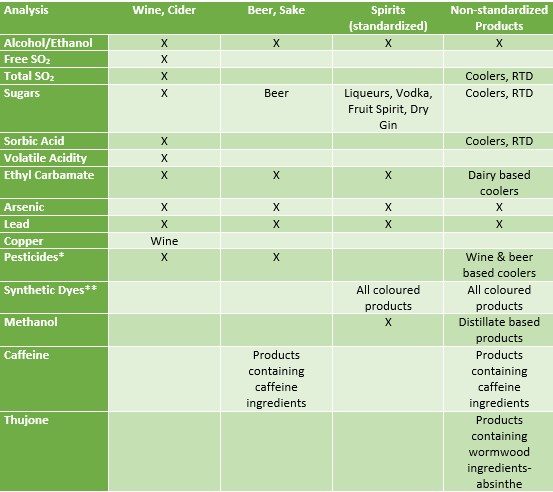To ensure product quality and safety, compliance with regulatory requirements and LCBO chemical and labelling standards, every product sold by the LCBO must undergo laboratory testing in accordance with the LCBO Quality Assurance protocols.
New products are tested upon receipt and annually the LCBO will select samples for testing which, includes chemical analysis and label compliance reviews.
Other components embedded into LCBO's Quality Assurance programs include sensory analysis and packaging compliance reviews.
The LCBO Quality Assurance Laboratory will conduct the chemical analysis and process a debit chargeback to the vendor. A Certificate of Analysis will be issued to the vendor after completion of the testing.
Chemical Analysis
The components of interest are primarily for regulatory purposes. The scope of analyses depends on the product type and may change from time to time; other tests may be added or removed as changes in regulatory and industry requirements occur.
Wine, Cider
Alcohol/Ethanol
Free SO2
Total SO2
Sugars
Sorbic Acid
Volatile Acidity
Ethyl Carbamate
Arsenic
Lead
Copper (for Wine)
Pesticides*
Beer, Sake
Alcohol/Ethanol
Ethyl Carbamate Sugars (for Beer)
Arsenic
Lead
Pesticides*
Caffeine (for products containing caffeine ingredients)
Spirits (Standardized)
Alcohol/Ethanol
Sugars (for Liqueurs, Vodka, Fruit Spirit, Dry Gin)
Ethyl Carbamate
Arsenic
Lead
Synthetic Dyes** (for all coloured products)
Methanol
Non-standardized Products
Alcohol/Ethanol
Total SO2 (for Coolers, RTD)
Sugars (for Coolers, RTD)
Sorbic Acid (for Coolers, RTD)
Ethyl Carbamate (for Dairy-based coolers)
Arsenic
Lead
Pesticides* (for Wine & beer-based coolers)
Synthetic Dyes** (for All coloured products)
Methanol (for Distillate based products)
Caffeine (for products containing caffeine ingredients)
Thujone (for products containing wormwood ingredients-absinthe)
________
* Pesticide Residues (standard panel): iprodione, carbaryl, myclobutanil, procymidone, azinphos-methyl (guthion), chlorpyrifos-methyl, diazinon, dichlofluanid,dichloran, dimethoate, fenarimol, imidan, methiocarb, parathion-ethyl, phosalone, triademefon, vinclozolin. Scope of pesticides may change from time to time.
** Synthetic Dyes (standard panel; permitted in Canada): Allura Red, Amaranth, Brilliant Blue, Erythrosine, Fast Green, Indigotine, Sunset Yellow, Tartrazine. Scope of the synthetic dyes may change from time to time.
Packaging & Labelling Compliance Review
The Quality Assurance department reviews cartons and consumer units to ensure they are compliant with Canadian regulations and LCBO standards.
Shipping Container Examinations: Cartons and trays are evaluated for structural design and integrity, as well as, printed case markings to ensure compliance with the LCBO Product Packaging Standards and Guidelines for Chemical Analysis and Canadian Association of Liquor Jurisdictions (CALJ) standards.
Burst Strength: Packaging materials are subjected to a Mullen test to ensure compliance with LCBO packaging standards..
Consumer Unit Label Reviews: Labels are reviewed to ensure compliance with federal and provincial label regulations, and LCBO requirements.
Corrective Actions
Products that are found not to comply with LCBO chemical analysis or sensory assessment, packaging/labelling, or CALJ Product Identification Standards for Use in the Distribution of Beverage requirements, at any time, will be treated by the LCBO in a manner appropriate to the type of defect or non-compliance, at the discretion of the LCBO but subject to the paramount consideration of public safety.
This may require one or more of the following actions:
- - Warehouse stock will be placed on hold
- - Retail stock may be withdrawn from sale
- - Wholesale Customers may be advised to withdraw the affected stock from sale
- - A public recall of the Product may have to be issued
- - Corrective action may have to be taken to rectify the deficiency by the Supplier.
If it is determined that the Supplier is responsible for the defect, or non-compliance, the Supplier will be responsible for all costs to remove or dispose of the Product or to rectify the deficiency. These costs may include:
- - Charges to correct packaging or labelling deficiencies
- - Destruction of warehouse and/or store stock at Supplier's expense
- - Return of warehouse stock to the Supplier at the Supplier's expense

